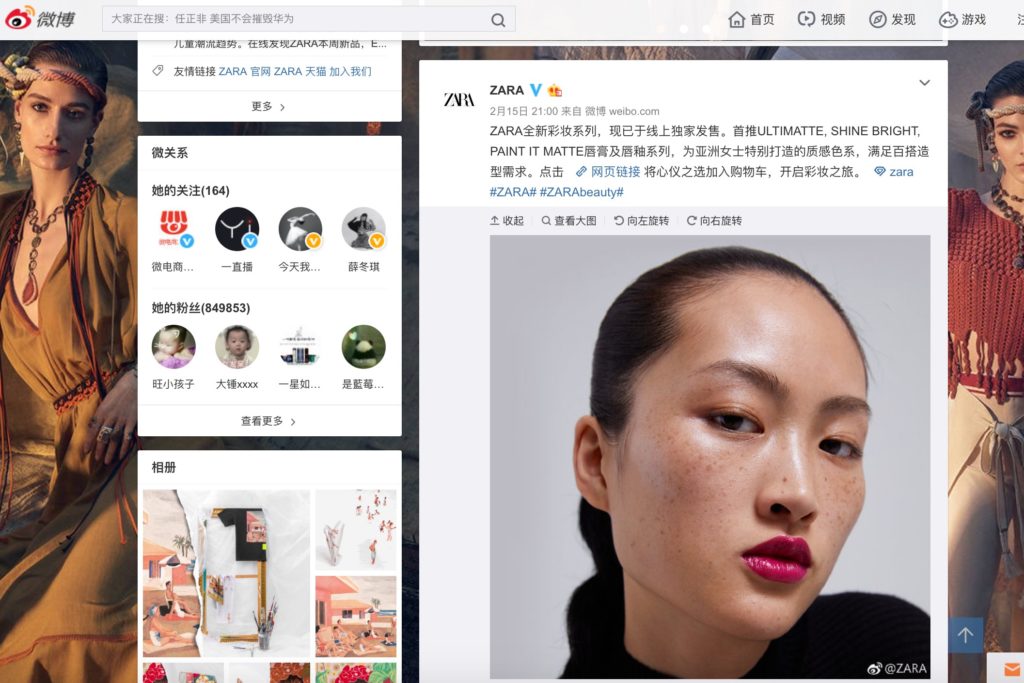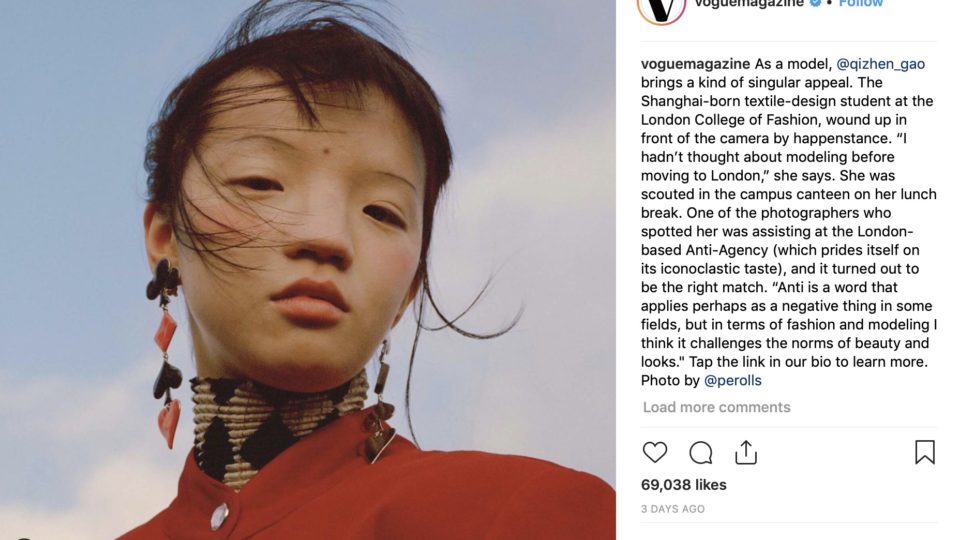American Vogue faced the might and fury of China’s hurt feelings this week after posting a photo of a “singular”-looking Chinese model on their Instagram page.
The American fashion magazine featured in their latest issue an interview and photo shoot with Shanghai-born model Gao Qizhen, also known as Gao Tin. Gao, 20, is a textile-design student at the London College of Fashion, who was scouted by the London-based “alternative modeling agency” Anti-Agency.
A photo from Gao’s shoot was posted on Vogue‘s Instagram page on Sunday with a caption saying she “brings a kind of singular appeal,” and it was not long before Chinese netizens flooded the post with comments accusing the magazine of racism.
Some focused on the use of the word “singular,” and criticized the outlet for “exoticizing” Asian models while continuing to select conventionally attractive white models.
However, the vast majority of responses objected to, as one user put it, the magazine giving people “a weird idea of what Chinese people look like.”
Other mean-spirited commenters waded into the fray, saying that Gao looked “really weird,” and that the publication should have picked “a normal-looking girl.”
Some even claimed the photos could lead to “racial discrimination against Asian people.”
Gao’s look doesn’t adhere to conventionally sought-after features typical to many Chinese celebrities, which include wide eyes with double-folded eyelids, long noses, and long oval-shaped faces with sharp chins, which are perceived as more feminine and “cute.”
In fact, the demand for conventionally beautiful features is such that the popularity of plastic surgery has skyrocketed. The number of people going for double-eyelid operations has surged in the last few years, according to the South China Morning Post. An HSBC report cited by the SCMP found that more than 7 million Chinese people had cosmetic surgery in 2014, and that the market was expected to double to 800 billion yuan (US$119 billion) by this year.
However, when asked to describe the artists and creatives that make up the Anti-Agency that hired her, Gao told Vogue that the firm was consciously working to promote unconventional beauty.
“Anti is a word that applies perhaps as a negative thing in some fields, but in terms of fashion and modeling I think it challenges the norms of beauty and looks,” she said, adding that “the word itself is quite empowering.”
The online dust-up calls to mind a recent case in which Chinese netizens’ feelings were “hurt” by the fashion label Zara, which chose to use freckled Chinese model Li Jingwen in an ad campaign. The decision set off a flurry of similar derision, with some expressing indignation that the brand would “pick a freckled face on behalf of Asian females,” and others accusing Zara of “uglifying Chinese women.”

Fair skin is also considered a desirable trait in China, where it has centuries-old associations with the upper classes, who spent their time indoors rather than working in the fields.
As they ultimately did in Li’s case, some commenters have leapt to Gao’s defense, accusing critics of willfully misinterpreting the use of the word “singular,” and pointing out that the interview was about “promoting self-confidence and self-esteem, rather than emphasizing on race.”
Some pointed out that Gao was simply a model who happened to be Chinese, and that she wasn’t there to represent all Asians.
Defenders were also quick to note that it was unfair to say Gao didn’t look “normal,” or fit the conventional Chinese standard of beauty.
Some said they liked Gao’s uniqueness, and told critics to “diversify their aesthetics” beyond China’s narrow ideas of beauty — enforced by ads, media, and beauty apps like Meitu (pronounced “may-too”), which allow users to touch up their selfies.
In an op-ed responding to the “freckle-gate” outrage, party mouthpiece China Daily also cited selfie apps as a force behind rigid Chinese standards of beauty. It too went on to blast critics for their narrow aesthetics.
The paper also hinted at a nationalistic motivation behind such outcries, noting that it was understandable that netizens might want to “prevent the nation’s image from being hurt.” However, it continued, doing so by lashing out at a brand for hiring a Chinese model with freckles betrayed a lack of “cultural confidence” — which, it noted, the Communist Party has sought to promote.





